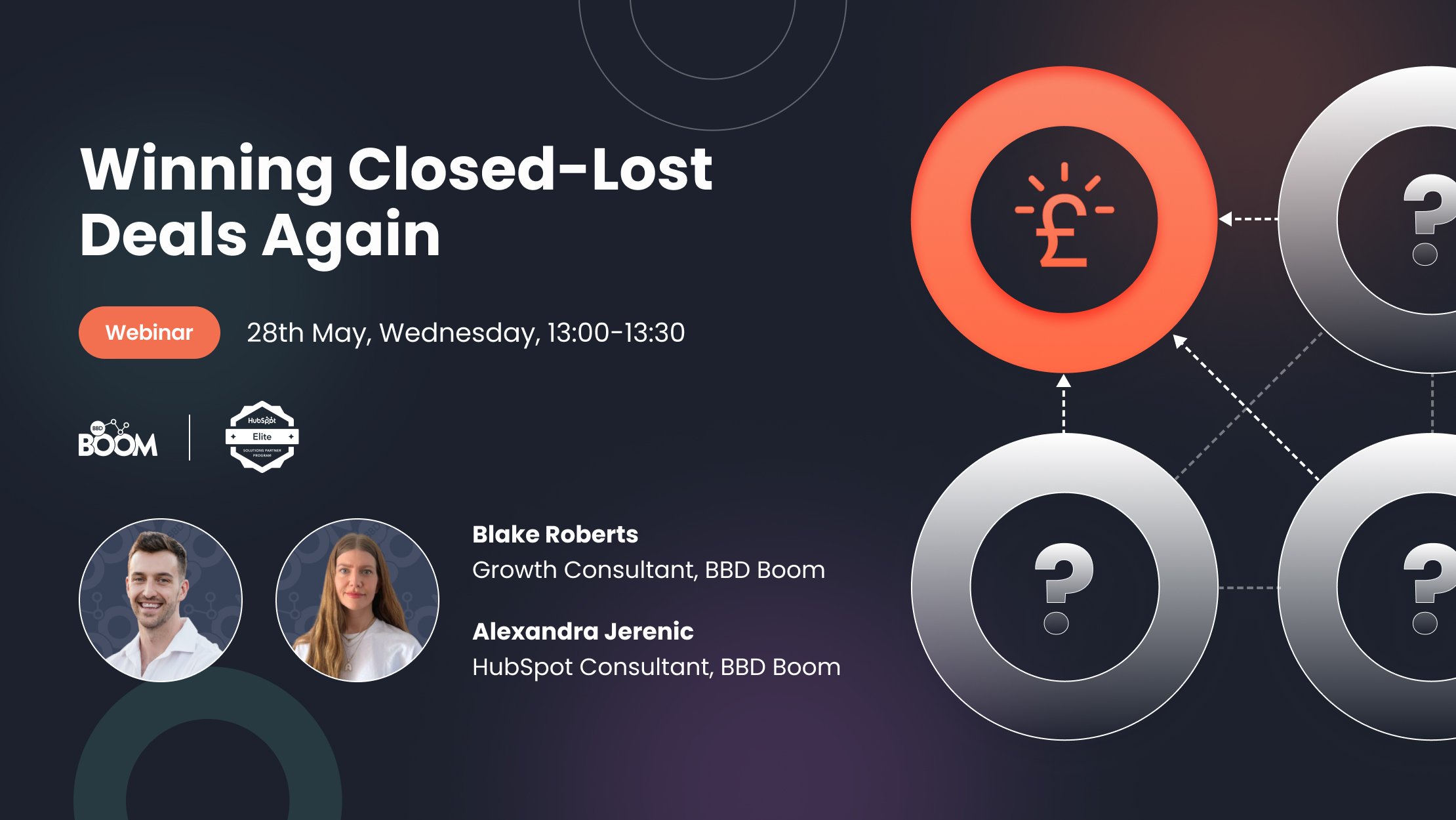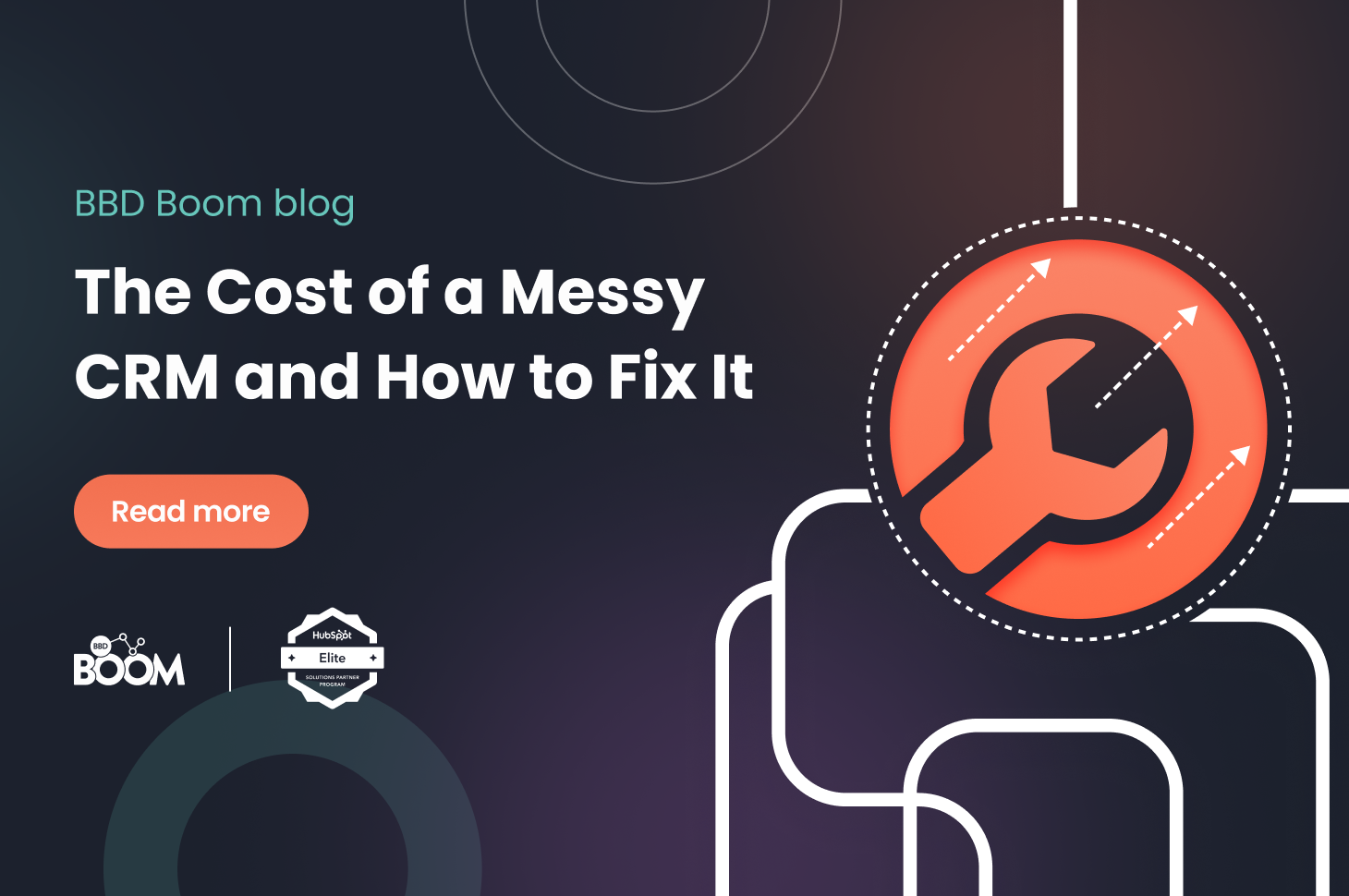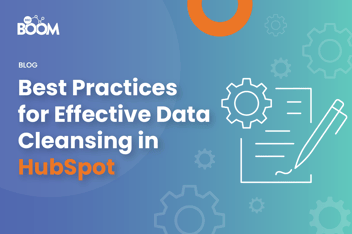A messy Customer Relationship Management (CRM) system can feel like a ticking time bomb for your business. While CRMs are designed to simplify operations, improve customer interactions, and drive growth, a poorly managed CRM can do the exact opposite. Let’s dive into the hidden costs of a messy CRM and explore actionable steps to fix it.
What Does a 'Messy CRM' Look Like?
How messy is your CRM? Be honest.
Like any other system that rely on data, CRMs are only as effective as the data they contain. While CRMs are designed to simplify operations, improve customer interactions, and drive growth, a CRM containing bad data can do the exact opposite and quickly turn your efforts into a huge mess. Bad data in your CRM can take several different forms:
- Wrong data — Wrong names, phone numbers, email addresses, or misfiled information can lead to miscommunication and missed sales opportunities.
- Missing data — Contacts, companies or deals missing critical fields like phone numbers, emails, lead source, or deal stage. These can impede your ability to engage effectively with leads and track progress.
- Inaccurate data — Using personal emails, misspelling names or relying on outdated job titles can lead to poor audience targeting and wasted resources. This also includes low-quality or inactive leads.
- Duplicate data — The same contact or company entered multiple times can cause redundant communication efforts, wasting time and resources while frustrating potential clients.
- Inconsistent data — Variations in formatting for the same info (e.g., “New York” vs. “NY” or “Closed Won” vs. “closed_won”). This can complicate data analysis and reporting, ultimately leading to flawed business decisions.
It's more than just data clutter though. Your CRM can quickly turn into a mess when not managed properly too. For example:
- Poor Reporting - Dashboards fail to provide actionable insights due to bad data or improperly set metrics.
- Poorly Defined Pipelines - Too many or too few deal stages, causing deals to get stuck and forecasting to fail.
- Unused Features - CRM features like workflows or automations are set up but not actively used or optimised.
- Lack of Team Collaboration - Team members fail to log activities, notes, or follow-ups properly, creating silos.
- No Governance or Data Cleaning Processes - Lack of regular checks to delete duplicates, update outdated data, or enforce standardisation.
- Lack of Integration with Other Tools - Key platforms (e.g., email, calendars, support tools) are not connected to the CRM, leading to inefficiencies.
- Overloaded Workflows and Automations - Workflows or automations are poorly designed, resulting in unnecessary tasks or bottlenecks.
Financial Costs of CRM Disorganisation
A messy CRM doesn’t just create headaches for your team, it directly impacts your bottom line. The financial costs of CRM disorganisation are often underestimated, but they can quietly add up to a significant drain on your resources. Let’s break down where the money really leaks.
Wasted Time = Wasted Money
When your team spends hours looking for missing information, updating incomplete records or manually fixing errors, that’s valuable time they could be spending on high impact tasks. If a salesperson spends just 10% of their week navigating CRM chaos, that’s 4 hours lost. Multiply that by the size of your team, and you’ve got a hefty labor cost with no ROI to show for it.
Missed Opportunities and Lost Revenue
A messy CRM can ultimately lead to disjointed communication and missed follow ups. When sales reps are working with incomplete or inaccurate data, deals fall through the cracks. Every missed opportunity is money left on the table, and over time, those small losses add up to a big hit on your revenue.
Inefficient Marketing Spend
When your marketing campaigns rely on outdated or duplicate contact data, your targeting becomes a mess. Instead of reaching the right people with the right message, you’re wasting budget on ineffective ads and irrelevant email campaigns. Poor segmentation means lower engagement rates and a weaker ROI from your marketing efforts.
Compliance Penalties and Risks
For businesses operating under regulations like GDPR or CCPA, disorganised CRM data can result in compliance violations. Storing inaccurate or redundant customer data can expose you to hefty fines, which could have been avoided with better data management.
Operational Inefficiencies
A messy CRM doesn’t just cost you money - it slows your entire business down. Disorganised data and chaotic processes lead to operational bottlenecks that spread across your teams, creating inefficiencies that drain productivity and momentum.
Wasted Time on Manual Work
When your CRM is cluttered, your team spends hours manually updating records and piecing together fragmented data. Instead of focusing on strategic tasks like closing deals or optimising campaigns, they’re stuck cleaning up the mess. These repetitive tasks can drain productivity and morale.
Broken Workflows and Process Gaps
A disorganised CRM disrupts workflows at every stage. For sales, it might mean working with outdated or duplicate leads, leading to missed follow ups. For marketing, poor segmentation results in irrelevant messaging. For customer service, incomplete histories make it harder to resolve issues efficiently. The result? Broken processes that impact your team’s ability to deliver results.
Poor Team Collaboration
Your CRM is essentially supposed to be the single source of truth for your business, but when it’s messy, it creates silos instead. Marketing, sales and customer support struggle to work together because they can’t trust the data - or they each have different versions of the truth. This lack of alignment slows down decision making greatly and undermines collaboration.
Delayed Response Times
When critical customer or lead data is buried in clutter, your teams response times are bound to take a hit. Whether it’s a sales rep trying to follow up on a lead or a support agent resolving a ticket, delays caused by poor data access can leave customers feeling frustrated and neglected.
The Hidden Cost: Team Morale
The thing about a messy CRM is it doesn’t just frustrate your processes, it frustrates your people. Imagine your sales rep is ready to close a deal, only to find the lead’s contact details are incomplete or duplicated three times over. Or your marketing team are trying to build a campaign, to realise that half the email addresses in the database are outdated. That constant uphill battle eventually takes a toll.
When your team can’t trust the tools they rely on, motivation will plummet. Instead of feeling empowered to do their best work, they feel stuck - wasting time on admin tasks that shouldn’t even exist in the first place. Over time, that frustration turns into burnout and when burnout sets in, you’re not just losing productivity - you’re risking losing talented team members altogether, and nobody wants that.
And let’s not forget collaboration. A messy CRM creates silos, making it harder for your departments to work together smoothly. Misaligned teams lead to finger-pointing, missed handoffs and a general sense of “why bother?” The cracks in your CRM will start to feel like cracks in the foundation of your team.
Strategies to Clean Up Your CRM
Cleaning up your CRM doesn’t have to be a nightmare - it’s all about taking it step by step. With the right approach (and maybe a little help), you can turn your messy system into a streamlined, stress-free powerhouse. Here’s where to start:
Give it a Good Audit
Time to rip off the bandage and figure out what you’re dealing with. Start by running a full audit of your CRM data. Look for duplicate contacts, incomplete records and any outdated information that’s just taking up space. For example, if you’ve got multiple entries for the same person with slightly different details, it’s time to merge those. And those leads from three years ago with no engagement? Probably time to archive them.
This is also a great time to identify patterns in the chaos. Are certain fields often left blank? Are some contacts missing key information? These insights will help you figure out where the breakdowns are happening so you can address them head on.
Set Some Ground Rules
The best way to avoid a messy CRM in the future? Lay down some rules now. Standardise how your team enters data, things like consistent formatting for phone numbers, company names and job titles. Create a cheat sheet or a quick guide to make it easy for everyone to follow.
For example, decide whether you’ll use “Ltd” or “Limited”, “Mobile” or “Phone.” It might seem small, but little inconsistencies add up quickly and make it harder to find and organise data. Clear rules ensure your CRM stays tidy and easy to navigate as your team grows.
Let Automation do the Work
Here’s a little tip: you don’t have to clean your CRM by hand. Most CRMs come with built in tools to handle repetitive tasks like merging duplicates or updating incomplete records. Use these features to save time and effort.
Many systems can flag duplicate entries for you or automatically update a contact’s information when new data is added from a reliable source. Take advantage of these tools to keep things clean without spending hours on manual fixes. It’s like having a digital assistant that’s always one step ahead.
Schedule Regular Clean Ups
Let’s be real - your CRM isn’t going to stay perfect forever. New data comes in every day, and things will inevitably get a little messy. That’s why it’s essential to build regular maintenance into your routine.
Set aside time every quarter (or even monthly if your database is growing fast) to review and clean up your CRM. Think of it like spring cleaning for your data, it’s easier to manage when you do it regularly instead of letting things pile up for a year. Bonus: regular maintenance helps catch small issues before they snowball into big problems.
Get your Team Involved
Your CRM is a team effort, so it’s crucial that everyone understands how to use it properly. Provide training sessions to show your team the ins and outs of your CRM system and explain why clean data matters. When your sales, marketing and support teams see how accurate data helps them specifically, they’ll be more likely to follow best practices.
Make it easy by giving them access to templates or pre-set workflows within the CRM. For instance, if a sales rep needs to add a new contact, make sure they know exactly which fields to fill out and how to format the data. This ensures consistency and avoids future mess.
Call in the Professionals, Hello BBD Boom!
Sometimes, no matter how hard you try, the chaos feels overwhelming. That’s where we come in. At BBD Boom, we specialise in taking disorganised CRMs and transforming them into streamlined systems that work for your business - not against it.
As a HubSpot Partner, we can help you with everything from auditing your data to setting up automated workflows and creating customised strategies to keep your CRM in tip-top shape. Plus, we don’t just fix the mess, we will give you the tools and training to prevent it from happening again. Partnering with us means you’ll have a shiny new HubSpot CRM that doesn’t just look clean but works like a dream.
Check out our Audit and Optimisation Support services here.
The Cost of Doing Nothing
Leaving your CRM in chaos isn’t just a minor inconvenience, it’s a ticking time bomb. The financial losses from missed opportunities, the operational inefficiencies that slow your team down and the toll it takes on your team’s morale all add up fast. A messy CRM doesn’t just hurt your bottom line today; it makes it nearly impossible to grow sustainably in the future.
So, what’s the real cost of doing nothing? More than you’re willing to pay. Now’s the time to take action, and if you’re not sure where to start, we’re here to help you make sense of it all. A cleaner, more efficient CRM (and a happier team) is just around the corner. Apply for a FREE audit here.

.png)






.png?width=2085&height=626&name=Landing%20Page%20Banner%20(Webinar).png)




